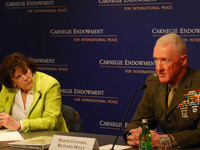Registration
You will receive an email confirming your registration.
With American troops scheduled to begin withdrawing in July and the summer fighting season still to come, the war in Afghanistan is at a critical point. Major General Richard Mills, recently the top Marine in Afghanistan, addressed the state of civil and combat operations in the country, the evolving security situation, and the challenges ahead. Carnegie’s Jessica Mathews moderated the discussion.
Southwest Afghanistan
Mills commanded coalition forces in the southwest of Afghanistan, in Helmand and Nimroz provinces. He spoke about his efforts to bring stability to the region and to bring the fight to the Taliban.
- A Legacy of Goodwill: There is a long history of U.S. involvement in Helmand province, particularly its capital of Lashkar Gah. In the 1950s and 1960s, the U.S. Agency for International Development (USAID) built an irrigation system in the province to harness the resources of the Helmand River. The population is concentrated around the river, and the irrigation system provides water that enables the area to be farmed year-round. The legacy of this project has created goodwill toward the United States in this region.
- Poppies and Opium: Helmand province provides an excellent environment for poppy cultivation, notably in Sangin in the north and Marjeh in the south. Although poppies are an excellent source of income for poor Afghan farmers, the heroin produced from these poppies not only ends up on the streets of American cities but also helps to fund the insurgency, Mills said. NATO forces have become involved with the interdiction of shipments, in the hopes of preventing funds from flowing to the insurgency, though they are not involved with eradication of poppy fields in southwest Afghanistan.
- Baramcha: Military raids against targets like the fortified town of Baramcha also help to prevent funds and weapons from reaching the insurgency. Baramcha serves as a transit point for weapons, fighters moving north to strengthen the insurgency, and opium moving south to fund it. Mills’s forces raided the town twice, significantly disrupting the Taliban’s ability to resupply and hopefully blunting the Taliban’s expected spring offensive.
Afghan Partners
Mills commented on coalition efforts to improve the readiness and capabilities of Afghan forces, so that they could take responsibility for their own security. He also spoke about efforts to improve the situation of ordinary Afghans through education and infrastructure programs.
- Simple Solutions: A number of important changes were made that reduced the rate of desertion and unexcused absence among Afghan soldiers. Such changes included ensuring that Afghan soldiers received a reasonable allotment of leave, paying soldiers on time, and enabling soldiers to electronically transfer funds to their families from base, rather than needing to return home.
- Independent Operations: Afghan units are capable of planning, deploying, and executing their own operations with limited coalition support, Mills stated. In September, the police and army were able to effectively secure a concert with 10,000 attendees, and another with 15,000 attendees, against Taliban threats. Mills also pointed to the successful parliamentary elections in September 2010 as evidence of the growing abilities of the Afghan security forces.
- Education: When Mills’s forces asked Afghans what projects they needed, the locals emphasized first and foremost the need for schools and education. Mills spoke of visiting a third-grade classroom and seeing teenagers who had never previously had the chance to be educated sitting among the students, eager to learn.
- Infrastructure: Afghans also emphasized the importance of improving local infrastructure and freedom of movement. When successful, the development of new roads had a tremendous impact on the lives of Afghans, as did radio programs and cell phone towers, Mills said.
- Women in Afghanistan: Coalition forces have very little direct access to women in Afghanistan, Mills said, because they are constrained by Afghan social norms. However, coalition forces have seen some small successes. Female Engagement Teams, made up exclusively of female sailors and Marines, were deployed at a local level to engage with Afghan women and learn about their needs. Furthermore, coalition forces tried to lead by example, letting Afghan men see Western women in combat gear and giving orders to lower-ranking servicemen.
- Reintegration: Mills described two different strategies for reintegrating insurgents into Afghan civilian life. The first is informal integration, where insurgents simply return to their previous lives. The second is a more formal, complicated reintegration process. Mills shared an anecdote from an Afghan leader, who estimated that of the insurgents, 70 percent could return to a normal life, 20 percent would require a formal reintegration program, and 10 percent will simply need to be killed.
